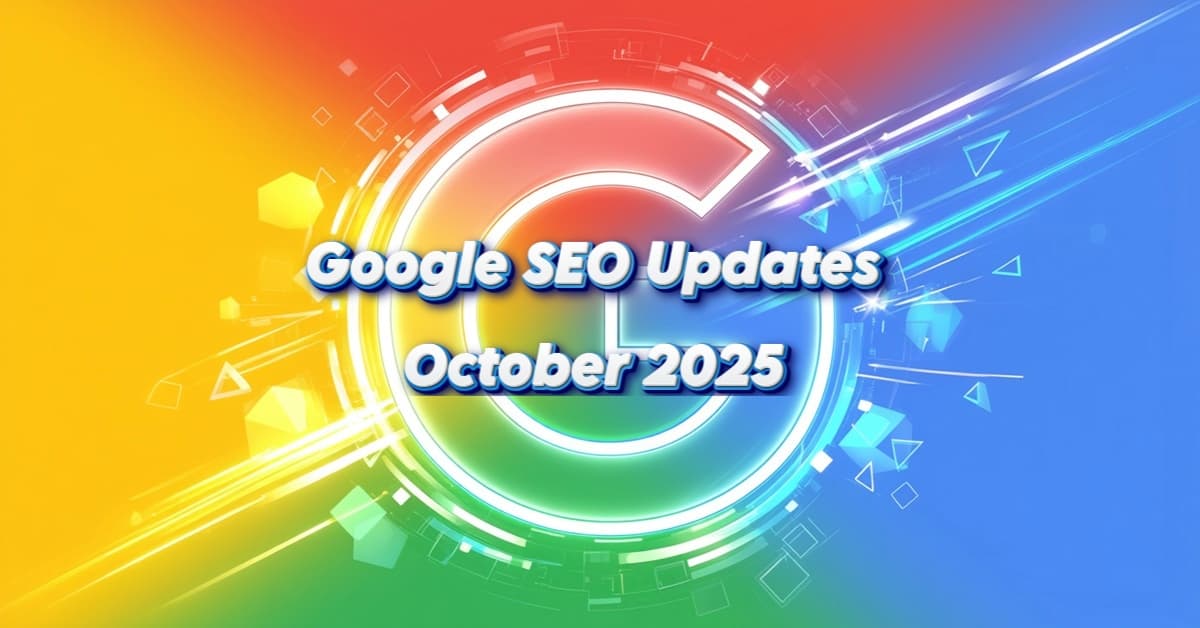
Asar
October 7, 2025
Staying ahead in the world of search engine marketing and SEO requires continuous adaptation to changing algorithms and industry shifts. The October 2025 updates highlight some of the biggest trends and changes, particularly from Google, that marketers should prioritize. This post covers these developments with actionable insights grounded in expertise and clear best practices.
Google’s October 2025 core update is laser-focused on high-quality, authoritative content. Websites that offer thorough, expert-led, and user-centric information are seeing improved rankings. Demonstrating real experience, expertise, and trustworthiness through comprehensive content, credentialed authorship, and transparency is more important than ever (source).
Tip: Regularly audit and update content to address user intent and ensure all information is factually accurate, well-organized, and references reputable sources.
Google’s advancements in AI-driven search are a game changer. Personalized, conversational results—powered by improved natural language processing—are now the norm. Sites with structured content (like FAQs and lists) and strong schema markup are being favored in both traditional and AI-powered searches (source).
Tip: Use structured data, natural language, and rich snippets to help Google understand your content and connect users with the information they seek.
Read more: Google AI Overviews are eating your clicks
The October update includes aggressive measures against manipulative tactics such as keyword stuffing, cloaking, and deceptive links. Only ethical and user-first optimization stands the test—so focus on original content and careful link strategies.
Mobile experience is paramount: sites must be responsive, load quickly, and be easy to use on all devices. Core Web Vitals (page speed, interactivity, visual stability) are crucial ranking factors, impacting both traffic and engagement.
Tip: Regularly test your site on various devices and optimize for speed and accessibility to improve rankings and conversions.
Local rankings are more competitive, with Google Business Profiles and positive reviews driving increased visibility. Consistent NAP data and the use of location-specific keywords are critical for capturing geographic traffic (source: quantifimedia).
Tip: Keep business profiles updated, solicit genuine customer reviews, and include local keywords strategically throughout your site.
Read More: 10 Amazing Benefits of Local SEO That Can Transform Your Business
OpenAI is signaling new ad opportunities with potential GPT-powered paid media platforms, a development that could impact SEM budgets in the coming months. What set the rumour mills buzzing was the news that ChatGPT’s parent OpenAI was hiring a Growth Paid Marketing Platform Engineer, apparently looking for ways to monetize the free users on their platform. This essentially means ChatGPT will grow more into an ads-based platform, thus giving brands and advertisers instant access to 700 million weekly users.
Meta’s ad-free subscriptions expansion in the UK (it started with the EU) means advertisers will have an even harder time reaching out to their already expensive audience.
Here are the details:
Meta’s ads-free subscription would cost users £2.99 per month on the web, and £3.99 on the iOS and Android apps for the first account. Subsequent account subscriptions would cost £2 or £3 respectively.
This rollout essentially is going to be a test as to how much users value an ad-free experience on Meta’s platforms.
For advertisers, this option could mean a shortage of inventory (lower reach) shift targeting accuracy and change budget allocation to increase ROI.
This would also set the template for future rollouts to other regions as well, more particularly the US.
TikTok ownership debates may impact digital ad inventory and targeting. It’s forced move to American majority ownership brings uncertainty around algorithm changes and advertising results, with much yet to be defined by the platform’s new decision-makers.
According to an executive order, Bytedance, TikTok’s Chinese parent and it’s affiliates will effectively own less than 20% of TikTok, while “certain investors” will control 80% of the entity giving it an American identity. The uncertainty around the new owners have also clouded the future of the platform’s algorithm.
Google removed the “&num=100” parameter, disrupting many rank tracking tools. This complicates data accuracy and tracking—reaffirming the need to measure broader business value and not rely solely on single-channel metrics.
By focusing on high-quality, expert-driven content and adapting to AI and mobile-first trends, marketers and site owners can navigate the volatile world of SEO and maintain strong search visibility. For in-depth assistance adapting to these changes, consulting an experienced SEO professional is highly recommended.
E-E-A-T stands for Experience, Expertise, Authoritativeness, and Trustworthiness. These are the criteria Google uses to evaluate the quality of website content. High E-E-A-T increases the likelihood of ranking well, especially for YMYL (Your Money, Your Life) topics.
Use FAQ sections, lists, and natural language answers.
Implement structured data/schema markup.
Make sure content clearly addresses common user questions.
Yes, Google removed a key URL parameter many rank trackers used, making it challenging to track 100 search results easily. This may affect impression and ranking metrics within SEO reporting tools.
Keep Google Business Profile information up to date.
Ask happy customers for positive reviews.
Use local keywords in on-page content.
Monitor profile suspensions, as reviews and compliance are under stricter scrutiny.
Keyword stuffing
Cloaking or hiding content
Clickbait headlines
Low-quality or irrelevant backlinks
Yes—Google’s algorithm continues to prioritize fast, mobile-friendly designs, clear navigation, and seamless experiences on all devices.
 in India
in India
It’s exciting to see Google’s focus on authentic content through E-E-A-T! I agree that regularly updating content is crucial. How often do you recommend performing content audits for optimal SEO?
E-E-A-T reinforces the importance of maintaining high-quality, authentic content.
For content audits, a good practice is to perform them quarterly. This allows you to Identify and update outdated information, optimize for evolving SEO best practices, refresh underperforming content and ensure alignment with current user intent and business goals.
However, for larger sites or fast-moving industries, monthly mini-audits on high-impact pages can be even more effective. It’s all about balancing effort with ROI.